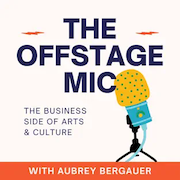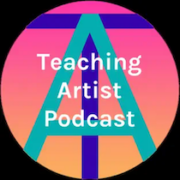-
The Best Art Podcasts for Arts Organizations, Educators, and Creatives
Podcasts offer a wealth of information, insights, and entertainment related to most any topic. Unlike videos or reading material, podcasts can be listened to on the go — in your car, at the gym, or while you’re painting, gardening, or walking the dog. That may be why podcasts are an increasingly popular form of content. That includes art podcasts for people involved with arts organizations, arts education, or creatives of any kind.
The number of podcast listeners in the U.S. rose steeply last year, according to Spotify’s Podcast Trends Report. About half of all American adults listened to a podcast in the past year, according to Pew Research Center. Of those, 10% are avid listeners who consume podcasts nearly every day, while another 25% listen a few times a month.
Surveys say 49% of Americans have listened to a podcast in the last year; 10% listened almost daily, and 25% listened a few times a month.
While Millennials and Gen Z currently represent the biggest segment of podcast listeners, this trend may not last much longer. With so many new shows being launched, listener demographics are changing, according to the Spotify report. “Podcasters proved that the medium truly offers something for everyone, helping to attract new audiences, both younger and older.”
What Are the Most Popular Podcasts?
From true crime to vegan cooking, podcasts cover a wide range of topics. The most popular podcasts are related to comedy and entertainment, reports Pew. According to Spotify, listeners streamed Society & Culture and News podcasts the most in the past year, across all platforms. And podcasts not only inform and entertain listeners, they also influence behavior: Pew found that 6 in 10 podcast listeners have watched a movie, read a book, or listened to music because of a podcast.
Podcasts not only inform and entertain, they also influence behavior: 6 in 10 listeners have watched a movie, read a book, or listened to music because of a podcast.
Below, we’re doing a deeper dive into podcasts related to arts and culture. Not just art history and the performing arts, but also arts education, marketing and leadership. Check out our list of the best art podcasts — plus a few podcasts that will interest anyone, no matter your niche.
The Best Art Podcasts
This podcast has 100 episodes dedicated to discussion of teaching art to kids, making art, and how those two practices overlap and feed each other. Hosted by Rebecca Potts Aguirre, a teaching artist living in Los Angeles who teaches visual art in elementary schools, most episodes are about an hour long and feature an interview with a teaching artist. Recent episodes include a collage artist talking about how the pandemic affected her work and an artist who works with students with disabilities.
Geared primarily toward K-12 educators, this art podcast will appeal to anyone interested in creativity and education. Host Susan Riley is a former music teacher turned education entrepreneur. In each approximately 30-minute episode, she shares powerful stories and strategies from authors, artists, and educators exploring the creative journey. Each episode is provided in audio, video, and written format and includes a downloadable resource.
The best podcasts don’t have to be lengthy to be worthwhile. If you’re looking for a quick hit of art history for yourself or your students, this podcast delivers. Covering the visual arts, each entertaining and informative episode is only about 10 minutes long, on average, and is aimed at all ages. Recent topics include how art affects the brain, who was Italian sculptor Donatello, and how Cirque de Soleil started.
Music Podcasts and Theater Podcasts
In this podcast, host and creator Hrishikesh Hirway asks musicians to delve into the specific decisions that went into creating their work. The result is an intimate, compelling story focused on how the artists brought their hit songs to life, inspiring music enthusiasts and other artists alike. Each episode is about 20 minutes long. Guests include Fleetwood Mac, Billie Eilish, U2, Metallica, Lorde, Yo-Yo Ma, The Roots, Bon Iver, and more. Song Exploder has been adapted into a Netflix series.
In The Greenroom: Theatre Marketing Podcast
Longtime theater marketing expert Julie Nemitz guides regional and community theatres to grow their revenue and delight their audiences. In recent episodes, she discusses attracting audiences with great marketing content, Broadway advertising, digital theatre, and the changing consumer behavior of theatergoers. Each episode ranges from about 30-45 minutes long. CourseStorm is pleased to sponsor In The Greenroom!
 The Offstage Mic: The Business Side of Arts & Culture
The Offstage Mic: The Business Side of Arts & CulturePassionate about helping arts organizations reach their highest potential, host Aubrey Bergauer has been hailed as “the Steve Jobs of classical music” and “the Sheryl Sandberg of the symphony.” In < 60 minutes, recent episodes educate listeners on such topics as how to self-release recordings without a label, developing alternate revenue streams, and a new framework for arts marketing. CourseStorm is proud to sponsor The Offstage Mic!
Business Podcasts and Related Topics
Billing itself as “the world’s first podcast about design,” Design Matters with Debbie Millman has been broadcast for over 15 years. The hour-long show examines how creativity combines with business, education, and other topics through in-depth conversations with designers, writers, artists, curators, musicians, and other creatives. Recent episodes have featured Alan Dye, vice president of human interface design at Apple, and self-taught footwear designer turned college president D’Wayne Edwards.
Subscription Stories: True Tales From the Trenches
“This is the podcast I have been devouring lately,” Bergauer told us. Host Robbie Kellman Baxter is the expert on the subscription/membership economy, and she interviews brands and marketers using a subscription model across all kinds of industries. The approximately 30-minute episodes feature brands like Netflix, Coursera, and digital language learning pioneer Babbel. Topics include mastering the subscription marketing mindset and customer retention analytics. “I love hearing what’s working in other sectors and drawing parallels to our industry,” said Bergauer.
In weekly ~ 30-minute episodes, host Adam Grant interviews leaders in their field on how to run organizations more effectively, develop high-performing teams, and address issues that affect most all of us. He has discussed building a strong team culture with Seattle Seahawks coach Pete Carroll, finding and becoming a great mentor with Wall Street veteran Carla Harris, and how to sustain creative energy with cellist Yo-Yo Ma.
“A lot of the challenges we face in the office (how to handle remote work, toxic bosses, improving company culture) affect just about every industry out there, so I love how Adam is addressing these big issues head-on with outstanding leaders every week,” said Bergauer.
Every weekday, host and journalist Elise Hu shares thought-provoking ideas on nearly every subject imaginable, from artificial intelligence to zoology. In bite-sized episodes ranging from 5 to 20 minutes, the world’s leading thinkers and creators invite you to change your perspective, pique your curiosity, and learn something new. Recent episodes discuss solving the climate crisis and educating girls in places that lack easy access to schooling.
More Art Education Resources
Whatever you’re interested in, whether arts and culture, business, education, or something else, there’s probably a podcast out there for you. Ask your students and colleagues what they’re listening to, browse the top podcasts charts, and keep an eye on the social media platforms of your favorite celebrities and brands. You may discover new podcasts you never knew existed. And if print is more your thing, check out our list of 12 Arts and Culture Magazines Worth Recommending to Students.
At CourseStorm, we know all about making learning accessible and appealing. Our easy-to-use class registration tools make it simple for students to sign up for your classes. Start your free trial to see our software in action, or contact us today for more details.
-
What Can We Learn From Smart Celebrities With a Love of Learning?
Like it or not, we live in a celebrity-obsessed culture. Whether it’s singer Taylor Swift, athlete Cristiano Ronaldo, media mogul Oprah Winfrey or any number of influencers on screen, stage, or social media, people want to know everything about them. We thought, why not use our natural curiosity about famous folks for good?
We’re turning the spotlight on celebrities who have demonstrated a lifelong love of learning.
Whether they are taking science classes for fun between acting gigs or teaching the general public how to code or how to cook like an award-winning chef, these high-profile people show us that education is for everyone, at any time of life.
As an education technology company, we at CourseStorm know that lifelong learning has enormous benefits. Whether you’re earning a college degree to pursue a specific career, taking evening improv classes for fun, or watching YouTube videos to learn how to produce music, it all enriches your life and even your health.
Read on to find out how some of the most famous people we know have embraced education, and get some ideas for what you might like to learn next!
-
Course Marketing Made Simple With Ideas From Author Leidy Klotz
Welcome to the first post in our blog series reflecting CourseStorm’s core values: Simplicity, Growth, and Helpfulness. Our mission is to streamline access to education to empower personal growth through our impossibly simple course registration software. In this post, we’ll be discussing the value of simplicity.
If you don’t think of yourself as a marketer, and sometimes even if you do, course marketing can feel like a complex task with too many moving parts. You might find yourself wishing for marketing made simple—a way to do less, but still get great results. That is the very theme of the book Subtract: The Untapped Science of Less by Leidy Klotz.
Through research and anecdotes, Klotz explores how subtraction can help us address everything from climate change and racism to city planning and play. If subtraction could help in all those areas, couldn’t it also apply to course marketing? Let’s find out.
-
Rainbow Flags and Story Quilts: Textile Art as Activism in U.S. History
It’s Pride Month, and rainbow flags are everywhere. If you’ve never considered the connection between textile art and activism, you’re in for a colorful history lesson. In fact, the United States has a rich history of weaving crafts such as sewing, knitting, and other fiber arts into its social justice movements.
Read on to learn more about “craftivism,” see examples of textile art as activism, and even find out how to create your own.
-
What Is Bloom’s Taxonomy and How Can It Improve Your Classes?
As an instructor, your main goal is to help students learn. That may sound simple, but meeting the needs of a class takes planning. Building courses around a clear structure can make a big difference to the student experience. Bloom’s Taxonomy is one way to do that.
But what is Bloom’s Taxonomy and how can it help you offer a better student experience? Think of it as a framework that helps you structure your classes. Although it’s not the only option out there, it is widely recognized as a useful tool for instructors. Learning more about it can help you provide a better learning experience for students.
-
The Power of the Arts to Positively Affect Health
Art is more than a fun category of classes to explore at your local enrichment program. According to researchers, the arts and health are closely linked. Engaging with art—whether through creating it or experiencing it—causes physiological and psychological changes that help reduce stress and promote relaxation. Art can help people process emotions, shift their perspective, and even help relieve pain. As a result, creative pursuits have a positive impact on both mental health and well-being.
People with a wide range of conditions, from anxiety and depression to chronic pain and cancer, benefit from art therapies. And if you’re generally healthy, art can help you stay that way. We’re not trying to say that art is some kind of miracle cure, but it is a fun and satisfying way to support physical and mental health. Here’s how it works.
-
What Is a Makerspace and How Can it Build Job Skills?
Do you want to learn a new skill or try out a new tool? Want to work on a specific project, make something with your hands, or meet new people who share your interests of creating and building? Makerspaces are the perfect place to do all of these things and more.
Whether it’s a makerspace in a school, a standalone facility, or a library makerspace, these hubs of creativity are cropping up all over the country. Many makerspaces are open to learners and makers of all ages. Some require a monthly membership or paid classes, while others are free to the public. Find out more about what makerspaces have to offer.
-
12 Arts and Culture Magazines Worth Recommending to Students
Magazines can offer students an inside look at arts and culture. With their beautiful photography and curated content, arts and culture magazines keep people informed and offer inspiration. Although often overlooked in the digital world, magazines provide a tangible way to explore cultural trends and learn about art even if you can’t attend every exhibit in person.
We’ve put together this list of arts magazines and culture magazines worth recommending to your students or to read yourself. You can use them as the starting point for a lesson plan or discussion or simply flip through each one to discover up-and-coming artists, learn about exhibitions and events, and explore new perspectives.
Why Arts and Culture Magazines Still Matter in a Digital World
When we talk about magazines, you may picture the pile of glossy pages in the waiting room of a doctor’s office. You might wonder why you should bother with all that paper if you have access to the internet. The truth is that most arts and culture magazines today offer both traditional print and online versions.
Reading an art magazine is like enjoying a piece of art. These magazines are typically high quality and beautifully designed.
Even if you choose to read only the online version, established art magazines are a good starting point. Unlike most personal or company-owned blogs, arts and culture magazines tend to rely on contributors who are established critics, scholars, artists, and subject matter experts. This conveys a level of credibility and ensures consistent quality.
Perhaps most significantly, enjoying an art magazine is like enjoying a piece of art. These magazines are typically beautifully designed, with high-quality photography and illustrations. Their aesthetic is part of their appeal.
If a subscription isn’t feasible for art programs or students on a budget, public libraries often have print or online versions of these magazines available to anyone with a library card.
12 Arts and Culture Magazines to Recommend to Your Students
With so many arts and culture magazines available today, it can be hard to narrow down your options. Each one is designed for certain interests and offers a unique viewpoint. We’ve listed a few of our favorites in no particular order.

Artforum
contemporary art, international art
Artforum is a leading contemporary art magazine known for its comprehensive coverage of international art. Founded in 1962, Artforum is one of the most influential art publications in the world.
It covers a wide range of topics related to contemporary art, including exhibitions, artists, art history, and critical theory. Expect to find in-depth articles and interviews with artists, curators, and other art world figures, as well as reviews of art shows and events from around the globe.
The Art Newspaper
fine art, design, architecture, photography & exhibitions
The Art Newspaper is a global news source for the art world, covering exhibitions, auctions, events, and more. Founded in 1990, the international edition is fed by a network of art publications in half a dozen countries.
It covers topics such as fine art, design, architecture, and photography. Alongside its monthly print edition, The Art Newspaper also publishes daily news online, a daily newsletter and a weekly podcast. It’s an especially valuable resource if you’re interested in learning about upcoming art exhibitions around the world.
Hyperallergic
art and culture through a social & political lens
Hyperallergic is an online publication with an emphasis on contemporary and emerging artists. Founded in 2009, Hyperallergic has become one of the most popular and widely read art blogs. It’s known for its sharp, critical voice and its coverage of underrepresented and marginalized groups in the art world. It covers a wide range of art-related topics, including exhibitions, books, films, TV series, and performance art. These topics are most commonly explored through the lenses of race, gender, and politics.

Juxtapoz
underground art & outsider perspectives
Juxtapoz is a print and online magazine showcasing underground and alternative art, including street art, graffiti, pop surrealism, and outsider art. Founded in 1994, Juxtapoz is a leading publication on underground art, known for its edgy and irreverent voice and its support for emerging artists. It has been instrumental in bringing to broader public attention art that exists outside the established world of “fine art.”
Aperture
Photography
Aperture focuses on contemporary and historical photography, with an emphasis on artistic expression and visual culture. Founded in 1952, Aperture built its reputation on high-quality content and critical perspective.
Regular topics include fine art photography, documentary photography, and photojournalism. Aperture is a nonprofit that supports emerging and established photographers with grants, scholarships, and publicity.
Sight and Sound
international film
Sight and Sound is a British film magazine which covers cinema from around the world with reviews, interviews, and analysis. It’s published by the British Film Institute (BFI), which is dedicated to preserving and promoting film culture in the U.K. Its coverage commonly includes reviews of new releases, features on classic and contemporary filmmakers, and analyses of film trends and movements.

Frieze
modern & contemporary art
Frieze is a contemporary art magazine featuring in-depth articles, reviews, and interviews with artists, curators, and collectors. It’s part of the Frieze platform for modern and contemporary art, which includes magazines, international art fairs, a gallery space, and events. Founded in 1991, it has regular columns on film, books, music, photography, and contemporary art. Alongside print articles you’ll find videos, podcasts, and playlists that explore art in unconventional ways.
Cabinet
art, culture, philosophy
Cabinet is a quarterly magazine that explores art, culture, and philosophy through essays, interviews, and artists’ projects. Since its founding in 2000, Cabinet has taken an interdisciplinary approach to art and culture, covering a wide range of topics including history, art, science, philosophy, and more. Published quarterly, Cabinet describes itself as “a sourcebook of ideas.”

Smithsonian Magazine
science, history, culture, arts
Smithsonian Magazine is a monthly magazine covering science, history, culture, and the arts, with a focus on American history and culture. Published by the Smithsonian Institution, a group of museums and research centers that promote education and research in a wide variety of fields, the magazine covers science, history, current events, culture, art history, exploration, and travel.
American Theatre
Theater
American Theatre bills itself as the only general-circulation magazine in the U.S. that is devoted entirely to theater. Covering performances, people, and events, this magazine is an essential resource for anyone interested in the stage. It puts American theater in context by also exploring important international theater in certain sections. Since fall 2023, American Theatre is published quarterly, both in print and online.
The New Yorker
Culture
No list of arts and culture magazines could be complete without The New Yorker. This well-known weekly magazine covers a wide range of cultural topics, including art, film, literature, and politics. Published since 1925, it is known for its high-quality journalism, fiction, poetry, cartoons, and essays. Its topics related to art and culture include literature, theater, music, and visual art. It publishes in-depth reviews and interviews with highly regarded cultural figures.

Dance Magazine
Dance
Dance Magazine is the flagship publication of a network of magazines covering dance with a focus on the United States. Other magazines from the same publisher include Pointe Magazine, Dance Teacher, Dance Spirit for teens and young adults, and Dance Business Weekly. They also publish a daily newsletter called “The Dance Edit.” One well-loved feature is the Friday Film Break, which features dance performances from dancers and choreographers across the country.
More Arts and Culture Magazines to Explore
Whatever element of arts and culture you’re most interested in, there’s probably a magazine out there designed for you. Don’t forget to ask your students what they’re reading! You may discover publications and perspectives you never knew existed.
Arts and culture magazines create an accessible entry point for students interested in the arts. At CourseStorm, we know something about making learning accessible. Our easy-to-use class registration tools make it easy for students to sign up for your classes. Start your free trial to see them in action, or contact us today for more details.
-
What Education Programs Need to Know About ChatGPT
ChatGPT might just be the biggest game changer in technology since the iPhone. Developed by the software company OpenAI, ChatGPT is a chatbot designed to produce language that sounds human. Users interact with the bot by typing questions, and the bot responds with answers that sound like they could have been written by a human.
Not only is the new chatbot an impressive step forward for artificial intelligence, it has also elicited controversy and strong opinions. Many who work in academia, education, or writing-heavy fields worry that the AI model presents copyright concerns, plagiarism issues, and a move away from the human element in writing.
Ultimately, ChatGPT is a tool. We’ll take a look at how you might use it to write course descriptions, titles, and other content, as well as the potential pitfalls to be aware of if you do.
-
5 Types of Workforce Training Programs Trending for 2023
The labor market changes so quickly that it can be hard to keep up with trends. These days, workers are switching occupations faster and more often than ever before. Forbes even renamed The Great Resignation “The Great Talent Reshuffle.” In this environment, the workforce training programs trending for 2023 are the ones that will help workers gain the needed skills for in-demand jobs.
Knowing what kinds of classes people are looking for can boost your enrollment and help your learners move toward meaningful career growth. We’ve identified some in-demand workforce training programs that you can add or expand in 2023.





